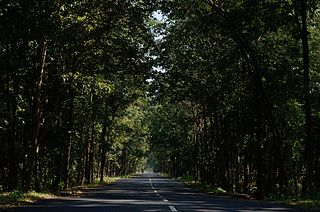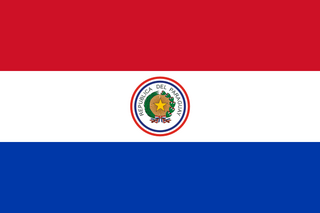Related Research Articles

The country of Brazil occupies roughly half of South America, bordering the Atlantic Ocean. Brazil covers a total area of 8,514,215 km2 (3,287,357 sq mi) which includes 8,456,510 km2 (3,265,080 sq mi) of land and 55,455 km2 (21,411 sq mi) of water. The highest point in Brazil is Pico da Neblina at 2,994 m (9,823 ft). Brazil is bordered by the countries of Argentina, Bolivia, Colombia, Guyana, Paraguay, Peru, Suriname, Uruguay, Venezuela, and France.

The economy of Paraguay is a market economy that is highly dependent on agriculture products. In recent years, Paraguay's economy has grown as a result of increased agricultural exports, especially soybeans. Paraguay has the economic advantages of a young population and vast hydroelectric power but has few mineral resources, and political instability has undercut some of the economic advantages present. The government welcomes foreign investment.
Agricultural economics is an applied field of economics concerned with the application of economic theory in optimizing the production and distribution of food and fiber. Agricultural economics began as a branch of economics that specifically dealt with land usage, it focused on maximizing the crop yield while maintaining a good soil ecosystem. Throughout the 20th century the discipline expanded and the current scope of the discipline is much broader. Agricultural economics today includes a variety of applied areas, having considerable overlap with conventional economics. Agricultural economists have made substantial contributions to research in economics, econometrics, development economics, and environmental economics. Agricultural economics influences food policy, agricultural policy, and environmental policy.
The Palestinian NGOs Network (PNGON) is a non-profit, non-governmental organization with a mandate to protect the environment of Palestine by acting as a coordinating body for Palestinian environmental organizations located in the West Bank and Gaza Strip. PNGON was initiated after the 2000 al-Aqsa Intifada due to heightened demands for Palestinian environmental organizations to defend the Palestinian environment.
The Deutsche Gesellschaft für Internationale Zusammenarbeit (GIZ) GmbH, often shortened to simply GIZ, is a German development agency headquartered in Bonn and Eschborn that provides services in the field of international development cooperation. GIZ mainly implements technical cooperation projects of the Federal Ministry for Economic Cooperation and Development (BMZ), its main commissioning party, although it also works with the private sector and other national and supranational government organizations on a public benefit basis. According to the OECD, 2019 official development assistance from Germany decreased 1.4% to USD 23.8 billion. In its activities GIZ seeks to follow the paradigm of sustainable development, which aims at economic development through social inclusion and environmental protection. GIZ offers consulting and capacity building services in a wide range of areas, including management consulting, rural development, sustainable infrastructure, security and peace-building, social development, governance and democracy, environment and climate change, and economic development and employment.

Social forestry is the management and protection of forests and afforestation of barren and deforested lands with the purpose of helping environmental, social and rural development. The term social forestry was first used in 1976 by The National Commission on Agriculture, when the government of India aimed to reduce pressure on forests by planting trees on all unused and fallow lands. It was intended as a democratic approach to forest conservation and usage, maximizing land utilization for multiple purposes.

FMO is a Dutch development bank structured as a bilateral private-sector international financial institution based in the Hague, the Netherlands. FMO manages funds for the Ministries of Foreign Affairs and Economic Affairs of the Dutch government to maximize the development impact of private sector investments. It is licensed as a bank and supervised by the Dutch Central Bank.
A sustainable food system is a type of food system that provides healthy food to people and creates sustainable environmental, economic and social systems that surround food.
The water resources management system in Uruguay has been influenced by the general sense of water as an abundant resource in the country. Average annual rainfall is 1,182 mm, representing a contribution of 210 km3 annually throughout its territory. In 2002, the per capita renewable water resources was 41,065 cubic meters, way above the world average 8,467 m3 in 2006. Uruguay also shares one of the largest groundwater reserves in the world, the Guarani Aquifer, with Brazil, Argentina, Paraguay. The Guarani aquifer covers 1,200,000 square kilometers and has a storage capacity of 40,000 km3.

Throughout its history, agriculture in Paraguay has been the mainstay of the economy. This trend has continued today and in the late 1980s the agricultural sector generally accounted for 48 percent of the nation's employment, 23 percent of GDP, and 98 percent of export earnings. The sector comprised a strong food and cash crop base, a large livestock subsector including cattle ranching and beef production, and a vibrant timber industry.
Fundación Paraguaya is a leading edge self-sufficient social enterprise founded in Paraguay in 1985 that seeks to develop innovative solutions to poverty and unemployment, and proactively disseminate them throughout the world.
The Amazonian Scientific Research Institute SINCHI is a non-profit research institute of the Government of Colombia charged with carrying out scientific investigations on matters relating to the Amazon Rainforest, the Amazon River and the Amazon Region of Colombia for its better understanding and protection. The word SINCHI, is a word in Quechua that means "strong" or "fierce".
A sustainability organization is (1) an organized group of people that aims to advance sustainability and/or (2) those actions of organizing something sustainably. Unlike many business organizations, sustainability organizations are not limited to implementing sustainability strategies which provide them with economic and cultural benefits attained through environmental responsibility. For sustainability organizations, sustainability can also be an end in itself without further justifications.
Sustainability standards and certifications are voluntary, usually third party-assessed, norms and standards relating to environmental such as IFGICT Standard, social, ethical and food safety issues, adopted by companies to demonstrate the performance of their organizations or products in specific areas. There are over 400 such standards across the world. The trend started in the late 1980s and 90s with the introduction of Ecolabels and standards for Organic food and other products. Most standards refer to the triple bottom line of environmental quality, social equity, and economic prosperity. A standard is normally developed by a broad range of stakeholders and experts in a particular sector and includes a set of practices or criteria for how a crop should be sustainably grown or a resource should be ethically harvested. This might cover, for instance, responsible fishing practices that don't endanger marine biodiversity, or respect for human rights and the payment of fair wages on a coffee or tea plantation. Normally sustainability standards are accompanied by a verification process - often referred to as "certification" - to evaluate that an enterprise complies with a standard, as well as a traceability process for certified products to be sold along the supply chain, often resulting in a consumer-facing label. Certification programmes also focus on capacity building and working with partners and other organisations to support smallholders or disadvantaged producers to make the social and environmental improvements needed to meet the standard.
The Moises Bertonoi Foundation was established in January 1988 in memory of Moisés Santiago Bertoni, as an environmental foundation and conservation, aiming to contribute to the protection and sustainable development of natural resources in Paraguay.

Anil Prakash Joshi is an Indian green activist, social worker, botanist and the founder of Himalayan Environmental Studies and Conservation Organization (HESCO), a Dehradun-based non governmental organization involved in the development of environmentally sustainable technologies for the agricultural sector. He is a recipient of the Jamnalal Bajaj Award and is an Ashoka Fellow. The Government of India awarded him the fourth highest civilian honour of the Padma Shri, in 2006, for his contributions to Indian society. He was also awarded by Padma Bhushan 2020 for social work in Uttarakhand.
Ecocrop was a database used to determine the suitability of a crop for a specified environment. Developed by the Food and Agriculture Organization of the United Nations (FAO) it provided information predicting crop viability in different locations and climatic conditions. It also served as a catalog of plants and plant growth characteristics.

Paraguay joined the World Bank Group on 28 December 1945. In 1951, the World Bank approved an Agriculture project in Paraguay marking the beginning of a partnership that persists to this day and has given rise to 76 development projects of which 6 are currently active. Paraguay has received $2,718,521,989 in total commitments from the World Bank. Paraguay saw an annual growth rate of 4.5% per year until 2016 making it one of the fastest growing economies among regional neighbors.The implementation of steady and dependable macroeconomic policies have fostered a friendly environment for investors that largely contribute to Paraguay's consistent economic growth, however much of Paraguay's economic development has resulted from the replacement of forests with agriculture operations. As forests become increasingly scarce and climate change disrupts agricultural output, Paraguay will be forced to adapt its economy and society to meet a number of targets including strengthening the rule of law, achieving sustainability in regards to its natural resources, investing in human capital, and improving government services. To achieve these goals, Paraguay is collaborating with the World Bank including strategic partnerships with IBRD, and IFC. Jordan Schwartz is the World Bank director for Paraguay and Matilde Bordón is the World Bank representative.
Martin Burt is a Paraguayan social entrepreneur, author, former mayor of Asunción and former chief of staff to Paraguay's President, known for founding Fundación Paraguaya in 1985, a leading non-profit and micro-finance organization in Paraguay, and creator of the Poverty Spotlight, a poverty measurement tool and coaching methodology.
References
- ↑ Mbertoni.org Archived 2008-12-03 at the Wayback Machine
| This article about an organisation in Paraguay is a stub. You can help Wikipedia by expanding it. |
| This agriculture article is a stub. You can help Wikipedia by expanding it. |